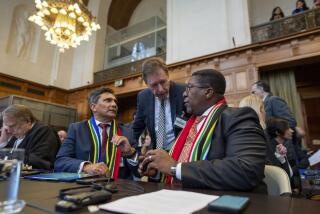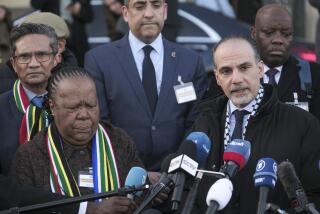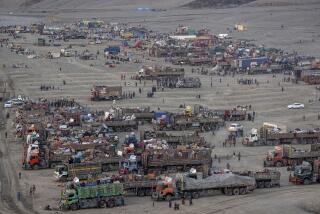Mass Grave Inquiry Wants Protection
- Share via
KABUL, Afghanistan — The United Nations has decided not to investigate two mass graves containing hundreds of war victims in northern Afghanistan unless foreign soldiers can protect the operation.
The U.N. demand for security comes amid ongoing violence in Afghanistan’s lawless north, where fighting between rival militias has claimed more than 20 lives in two weeks. It also underscores the U.N.’s fear of what could happen in a country that has seen many atrocities over 23 years of warfare.
The recommendation that the graves be unearthed only under the protection of international troops was made in a study by William Haglund, a noted forensic anthropologist who likely will direct the investigation, a U.N. official in Kabul told The Times. The U.N. has accepted his recommendation.
Until the study was completed, the U.N. expected that promises of protection from local authorities would permit the digging to start, possibly this month. But the volatile political scene and warnings from warlords that they “could not commit to 100% security” led the U.N. to insist on outside protection, the official said.
One of the sites to be unearthed is in Dasht-i-Leili, near Sheberghan, where hundreds of Taliban prisoners are believed to have been buried after they suffocated in metal truck containers in December 2001. They died while being transferred to a prison in Sheberghan from the northeastern city of Kunduz after the overthrow of the fundamentalist regime.
Human rights groups have accused warlords in the victorious Northern Alliance of permitting the deaths and secretly burying the bodies. U.S. human rights groups clamored for an investigation last year because U.S. soldiers reportedly were seen accompanying warlord Rashid Dostum’s troops during the prisoner transfer.
The exact number of victims may never be known because there was no count of those loaded onto the trucks nor of captives who made it to the prison. Dostum and rival warlord Mohammed Atta issued a statement in August admitting that more than 200 prisoners died in the airless containers but blamed the deaths on wounds and illnesses before capture.
Others say the number of victims could be several times that amount. An estimated 2,000 to 4,000 Taliban were detained at the end of the fighting, and some observers say no more than about 1,200 eventually were imprisoned. Preliminary work by Haglund at the Dasht-i-Leili site in December indicated a “large number” of bodies.
President Hamid Karzai last summer denounced the deaths as “atrocities” and said he supports the U.N. investigation. The lead agency will be the Afghan Independent Human Rights Commission, which the U.N. will train in forensics. The plan is for Afghans to use those skills to investigate hundreds of mass graves that human rights officials say exist.
In a concession to the warlords, who are officials of the Karzai government, the U.N. also plans to investigate a mass grave in Jaghalkani-i-Takhta Pul, near Mazar-i-Sharif, which is thought to contain hundreds of victims massacred by the Taliban after the Islamic radicals took the city in 1998.
The U.N. also asked warlords to allow a program that will protect several witnesses who are prepared to testify, including some survivors of the ride from Kunduz to the Sheberghan jail. No such commitment has been received, the U.N. official said Thursday.
The U.N.’s high commissioner for human rights, Sergio Vieira de Mello, requested help from foreign militaries in overtures made to the 4,700-soldier International Security Assistance Force and to the U.S.-led coalition military force of 11,500 soldiers. He has received no positive response so far.
Saying it lacks resources, the international security force has resisted the pleas of the U.N., aid agencies and other multinational groups that it extend its operations outside Kabul, where it patrols. The U.S. military and other coalition members have confined their operations to battling remnants of the Taliban and Al Qaeda, principally in the southern and eastern parts of the country. The British military is opening a small base near Mazar this summer to enhance security and perform reconstruction. There has been no indication that those duties could include protection for workers at the mass graves.
The investigation of mass graves is a delicate issue not only because of culpability issues, but also because rival factions are angling for position in the nationwide and provincial elections in June 2004. The findings of the investigation could have an effect on the vote.
Meanwhile, U.N. officials said violence claimed four civilian lives in the northern province of Samangan last weekend, including that of a 6-year-old girl.
Last week, fighting between militias loyal to Dostum and Atta broke out in Meymaneh, in the northern province of Faryab, leaving 17 dead.
More to Read
Sign up for Essential California
The most important California stories and recommendations in your inbox every morning.
You may occasionally receive promotional content from the Los Angeles Times.













